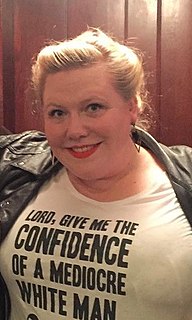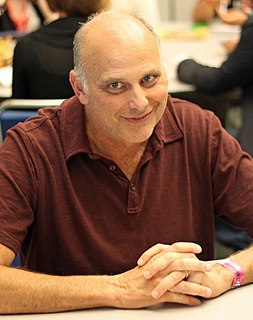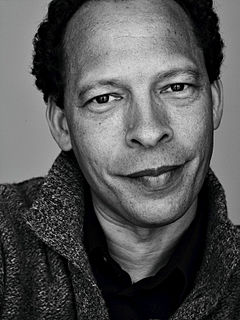A Quote by Lindy West
In my freshman year of college, when a male professor asked the class, "Who here identifies as a feminist?" Only one girl raised her hand, and the rest of us just sat there. He basically just shamed us for the rest of the class?? - ??in a constructive way. He went around the room and said to each girl, "Why didn't you raise your hand? Feminism means men and women deserve the same rights, and that the balance in the world is currently tilted in men's favour.
Related Quotes
I get very frustrated when I hear women saying, "Oh, feminism is passé," because I think feminism means empowerment. Men can be feminists, too! Many men are feminists. We need feminism. It's not against men; it's about the empowerment of women. It's the respect of women - giving women equal rights, the same opportunities.
I remember somebody had said to me "What're you doing with a movie like Boiler Room? It's all men and you're a woman. You should be making romantic comedies," or something like that. Boiler Room, for me, was a morality tale. I remember this interview where they said to me "Yeah, but all the characters are men," and I was like, "But I'm a girl, I like men!" It's not like there's nothing interesting to me just because a lot of characters in that movie happen to be male. Just because I'm a girl doesn't mean I only wanna make Must Love Dogs over and over again.
The liberal wing of the feminist movement may have improved the lives of its middle- and upper-class constituency--indeed, 1992 was the Year of the White Middle Class Woman--but since the leadership of this faction of the feminist movement has singled out black men as the meta-enemy of women, these women represent one of the most serious threats to black male well-being since the Klan.
And while you and the rest of your kind are battling together-year after year-for this special privilege of being 'bored to death,' the 'real girl' that you're asking about, the marvelous girl, the girl with the big, beautiful, unspoken thoughts in her head, the girl with the big, brave, undone deeds in her heart, the girl that stories are made of, the girl whom you call 'improbable'-is moping off alone in some dark, cold corner-or sitting forlornly partnerless against the bleak wall of the ballroom-or hiding shyly up in the dressing-room-waiting to be discovered!
Recently, I wrote that feminism was 'finding a way of being a girl that doesn't hurt' a way for girls and women to re-negotiate our understanding of the world so that we can become a full and equal part of it rather than just a means of decorating it; to move towards a place where the mere act of being a girl isn't used against us as both a threat and an obligation. Through feminism, I have found a peace of sorts from the sense that my femaleness required a constant apology so that I might be given permission to pass through these narrow corridors.
I cannot imagine why a woman would ever call herself anything but a feminist. But a man calling himself a feminist, what does that mean? The answer is he wants to be taken as a good guy. Your choice is between saying you're a feminist and raising a flag at a "Take Back the Night" rally and being a men's rights activist, which is basically the only two ways men have of talking about gender right now, I mean that's just ridiculous. That's just two extremes that are totally useless.
People ask me almost every day, "Why? You are successful, you have kids, you have grandchildren, so why?" Feminist women are seen as unsatisfied. But all women in the world, if they are well aware of inequality, are unsatisfied women. They don't have the same rights as men, and there is no freedom until there is equality between men and women.
Feminism is a choice, and if a woman does not want to be a feminist, that is her right, but it is still my responsibility to fight for her rights. I believe feminism is grounded in supporting the choices of women even if we wouldn't make certain choices for ourselves. I believe women not just in the United States but throughout the world deserve equality and freedom but know I am in no position to tell women of other cultures what that equality and freedom should look like.
Radical feminist theorists do not seek to make gender a bit more flexible, but to eliminate it. They are gender abolitionists, and understand gender to provide the framework and rationale for male dominance. In the radical feminist approach, masculinity is the behaviour of the male ruling class and femininity is the behaviour of the subordinate class of women. Thus gender can have no place in the egalitarian future that feminism aims to create.
To say anything about women and men without marking oneself as either feminist or anti-feminist, male-basher or apologist for men seems as impossible for a woman as trying to get dressed in the morning without inviting interpretations of her character. Sitting at the conference table musing on these matters, I felt sad to think that we women didn't have the freedom to be unmarked that the men sitting next to us had. Some days you just want to get dressed and go about your business. But if you're a woman, you can't, because there is no unmarked woman.
I told my friend - we were working on a movie together - and he gave me a script and asked me to give him notes. And they were all male characters, and I said, "You know what would make this character more interesting?" And he asked what - and it's this road trip between three guys, basically, one older man, one 30-year-old and a 13-year-old mechanic. And I said, "If you make the 13-year-old a girl, and you make her an Indian-American mechanic." And he said, "What do you mean?" And I said, "Yeah, don't change anything in the script about him, and just make it a her."






































